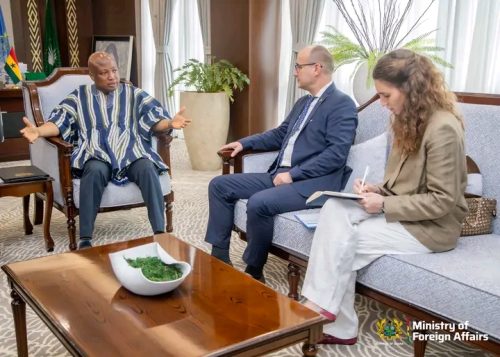

By Enock Akonnor (Managing Editor)

Ghana has secured a major boost for its oil and gas sector following the signing of a $1.5 billion Memorandum of Intent between the Government of Ghana, ENI, Vitol, and the Ghana National Petroleum Corporation (GNPC).

The agreement was formalised at the ongoing Africa Oil Week in Cape Town.

Minister for Energy, Hon. John Abdulai Jinapor, who signed the agreement on behalf of the government, announced the development via a statement on his official Facebook page.
He described the investment as a strategic move to revitalise Ghana’s upstream petroleum sector and accelerate growth within the energy industry.

“This is not just a figure on paper; it is a vote of confidence in Ghana’s upstream petroleum sector, our economy, a commitment to job creation, and a catalyst for the infrastructure that will power our nation forward,” the Minister stated.
The deal, involving energy giants ENI and Vitol alongside GNPC, aims to expand oil and gas production capacity and optimise existing resources.
It also aligns with Ghana’s broader energy strategy, particularly the recently adopted Gas-to-Power policy. This initiative seeks to harness the country’s natural gas reserves for electricity generation, a move expected to bolster energy security, reduce dependence on imported fossil fuels, and promote sustainable development.
Minister Jinapor reaffirmed the government’s commitment to restoring momentum in oil production, which has declined in recent years. “We will continue to reset the upstream petroleum sector to address the dwindling oil production witnessed in the last couple of years,” he added.
The announcement echoes the vision laid out by former President John Dramani Mahama, under whose leadership Ghana is working to create an investor-friendly business environment while safeguarding national interests.
The $1.5 billion strategic investment is expected to deliver long-term benefits, including increased energy access, improved industrial capacity, and job creation across Ghana’s oil and gas value chain.
Source; www.leakyghana com

Enock Akonnor is an experienced Ghanaian journalist, based in Kumasi and currently serves as the CEO and Managing Editor of www.leakyghana.com.
With a wealth of expertise built over many years in the media industry, he has earned a solid reputation as one of Ghana’s most sought-after journalists.
Contact:
📞 +233 541 921 562
✉️ enockakonnor2013@gmail.com









